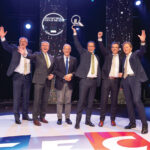Scania: propelling Ipelegeng to success
Scania: propelling Ipelegeng to success
The last two years have been incredibly tough for bus operators all over the world. Ipelegeng Transport Trust has survived – and indeed prospered – thanks to its partnership with Scania.
Anyone in the bus and coach industry will tell you this: they’re mighty glad that the last two years are done and dusted. It was a miserable time for them; Covid regulations mandated operators to run at 50% capacity, making business extremely tough.
“This was an enormous challenge for our business. A 50% passenger capacity doesn’t support the business model. Fuel and driver costs remained at 100% but our revenue halved,” notes Kabelo Mphahlele, chief operating officer of Ipelegeng Transport Trust.
Recent threats of violence emanating from a competing transport sector are also threatening to derail the bus industry’s recovery efforts. “The cake is now smaller,” says Mphahlele. “Passengers should be allowed to choose where they want to spend their money. However, our competitor wants to keep its passenger loads at levels that reflect past figures. These are no longer sustainable.”
Despite these challenges, Ipelegeng – which was founded in 1998 – is continuing to serve its passengers, and a customer-centric partnership with Scania promises to take the company to new heights.
Ipelegeng provides a commuter service in Gauteng’s Sedibeng District, moving more than 10 000 people daily from their homes to work, malls, and events. It runs a fleet of 93 buses, including 40 Scanias.
The company’s relationship with Scania began with the purchase of 16 Scania F250 manual buses nearly a decade ago. “It was a different relationship back then,” explains Mphahlele. “I have seen a positive evolution at Scania. Our first delivery in 2014 didn’t come with the support we needed. But our latest purchase of 24 Scania buses has been faultless. They understand our business and are committed to helping us succeed.”
The Scania F250 manuals have proven to be a great asset to the company. “Even though they are manual boxes, the running costs are low compared to the other vehicles in our fleet. These buses are robust and adapted for our operating conditions,” says Mphahlele.
The recent addition of 24 new Scania buses with automatic transmissions has taken the operation to new cost efficiency levels, with fuel savings being the main driver of increased profitability. “The older vehicles we had before the Scanias were highly inefficient. At some stages, we were recording 56 l/100 km. With the Scanias, we are realising 40 to 38 l/100 km,” reveals Mphahlele.
Using the monthly telematic vehicle reports issued by the Scania team, Mphahlele has been able to pinpoint the drivers whose driving styles need attention. “The reports allow us to keep drivers updated on their performance so they can correct any issues,” he says. “The key to fuel efficiency is driver behaviour.”
After purchasing the new Scania buses, Ipelegeng opted to go with a Scania maintenance contact. “Scania set up a workshop on our premises and this is working very well,” says Mphahlele.
The new Scania fleet has also assisted Ipelegeng to streamline the accessibility of its parts. “Some of the vehicles we have are more than 40 years old. Finding reliable parts is a challenge. With the new Scania buses, parts availability is resolved,” notes Mphahlele.
Future plans include the purchase of eight new buses. “Upgrading is proving profitable for us,” explains Mphahlele. “With the upgrades, maintenance is decreased and fuel efficiency is significantly improved.”
Coming back from a negative operating environment has not been easy but Mphahlele credits the Scania team as a key factor in the company’s recovery. “We’ve been with other OEMs, and we’ve never come close to seeing the kind of service we are getting from Scania. I appreciate being able to sit down with the team and find the solutions that are taking our business forward.”
It’s a sentiment echoed by Oan Scriven, sales manager, Scania Southern Africa. “When there are challenges we are able to be flexible and adapt,” he notes. “I think we are making great inroads and we look forward to supporting Kabelo and the Ipelegeng Transport Trust team in their future efforts to grow the company.”
Published by
Focus on Transport
focusmagsa




